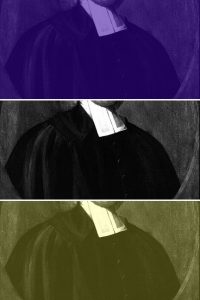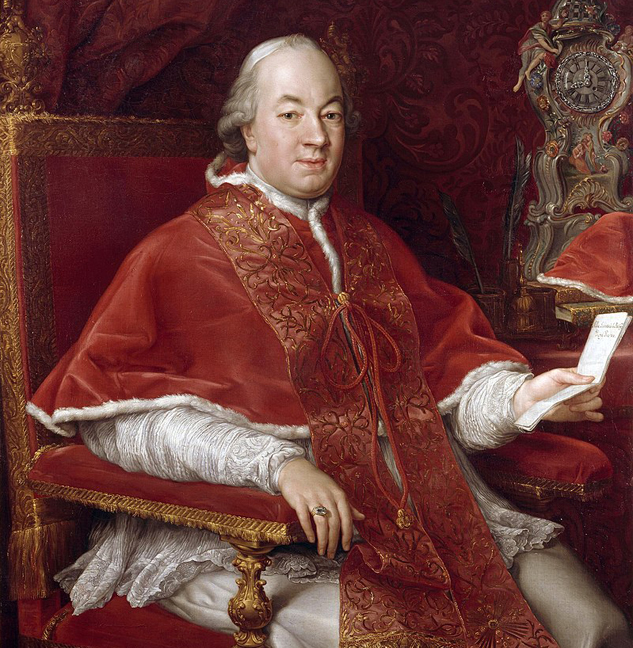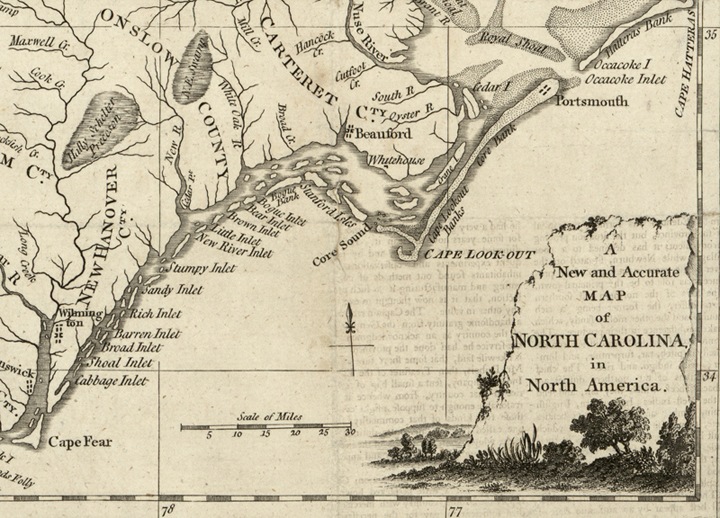One of the lesser known but highly influential forces that kept the doctrines of the social contract, natural rights and the rule of law first and foremost in many colonists’ consciousness was the New England Clergy. They believed there was a divine covenant between man and God that was fixed, sacred and inviolable; from that covenant flowed the general principles of justice and equity and from the general principles flowed man’s “natural rights.” They believed that these rights had been planted deep in men’s hearts by God and “written as with a pen of iron and the point of a diamond.”[1] In 1669 John Davenport said in an Election Sermon, “the law of Nature is God’s law” both sacred and legally binding.[2]
Just as the clergy based their theology and Church structure on the law of God, so they based their political theories. Civil government had a divine origin and its purpose was “the good of the people.” A government that did not have this as its purpose, did not have a divine origin and thus did not have the sanction of God. In 1717, John Wise, in his treatise, A Vindication of the Government of New-England Churches, took it a step further when he said, “A democracy, this is a form of government, which the light of nature does highly value, and often directs to, as most agreeable to the just and natural prerogative of human beings …”[3] In 1759 Samuel Langdon in a sermon said that a government which had a constitution agreeable to the laws of nature, serving the ends of society, securing the life, liberty, and property of the people was … “conformable to the perfect pattern of (God’s) dominion.”[4]
The clergy believed it was their duty to warn their congregations against wrongdoing and to enlighten them about the principles upon which they were to act and the views they were to hold. The clergy did not hesitate to focus their sermons on what constituted lawful authority, that is, the ruler’s obligations and people’s rights. Gershom Bulkeley, in Will and Doom or The miseries of Connecticut by and under an usurped and arbitrary power, said no law can be contrary to the law of nature, all lawful authority comes from God, and unlawful authority may be resisted; it was not only legal to do so but a religious duty.[5]
In 1713, John Buckley in an Election Sermon said that rulers must not be arbitrary, but rather, “labour to imitate the Divine Government; which is manag’d by fixed and steady Rules … Its not in the Power of Rulers to make what Laws they please, Suspend, Abrogate or Disanul them at pleasure … as for mens Civil Rights, as Life, Liberty, Estate, etc… God has not Subjected these to the Will & Pleasure of Rulers, They may not Enact any Laws to the Prejudice of them, nor Disanul such Laws of the State as tend to Secure these Interests … Tis already Determin’d in the Divine Law that the Enjoyment of them be free & undistrub’d and Rulers may not make any Determinations repugnant here to: Or, if they do they are of no force. No Law of the civil Magistrate can bind in Opposition to the Divine.”[6]
By the time the Stamp Act was passed, the New England colonists had already heard from the pulpit numerous sermons about natural law, their chartered rights, and their rights as Englishmen.
On August 8, 1765, Jonathan Mayhew in the sermon A Discourse Concerning Unlimited Submission and Non-resistance to the Higher Powers, stated, “When once magistrates act contrary to their office and … cease to be the ordinance and ministers of God… (it is warrantable) to disobey … in cases of very great and general oppression, when humble remonstrances fail of having any effect; and when the public welfare cannot be otherwise provided for and secured, to rise unanimously even against the sovereign himself, in order to redress their grievances; to vindicate their natural and legal rights; … to free themselves and posterity from inglorious servitude and ruin.”[7] The following year Mayhew would suggest to James Otis the idea of a circular letter to bring about a “communion of colonies.”[8]
 On December 18, 1765, Stephen Johnson preached what became known as a “fast” sermon. In Some Important Observations, Occasioned by, and adapted to, The Publick Fast, Ordered by Authority, he said the Stamp Act was a “high and aggravated Injustice” the purpose of which was the “enslaving of a free people.”[9] He believed that the abolition of their charters and rights as Englishmen and the annulling of their legislative bodies dissolved their connection with England thus returning them to “a state of nature.” Independence was not desired, but often forced upon the oppressed and if it came to slavery or independence, the colonists would not hesitate. He referenced John Locke when he said that any attempts to take away their natural rights constituted a state of war in which the colonists were entitled to defend their rights.
On December 18, 1765, Stephen Johnson preached what became known as a “fast” sermon. In Some Important Observations, Occasioned by, and adapted to, The Publick Fast, Ordered by Authority, he said the Stamp Act was a “high and aggravated Injustice” the purpose of which was the “enslaving of a free people.”[9] He believed that the abolition of their charters and rights as Englishmen and the annulling of their legislative bodies dissolved their connection with England thus returning them to “a state of nature.” Independence was not desired, but often forced upon the oppressed and if it came to slavery or independence, the colonists would not hesitate. He referenced John Locke when he said that any attempts to take away their natural rights constituted a state of war in which the colonists were entitled to defend their rights.
Jonathan Cogswell, in a 1757 sermon to an artillery company under Captain Israel Putnam, said, “… When our Liberty is invaded and struck at, ‘tis sufficient Reason for our making War for the Defence or Recovery of it. Liberty is one of the most sacred and inviolable Privileges Mankind enjoy; … what Comfort can a Man take in Life when at the Disposal of a despotic and arbitrary Tyrant, who has no other but his Will: … To live is to be free: Therefore Violence threaten us with the loss of so dear a Blessing, ‘tis Time to rouze, and defend our undoubted and invaluable Privileges … When our Religion is in danger … it will warrant our Engaging in War … Religion is a treasure never to be parted with … we fight for our Properties, our Liberties, our Religion, our Lives …”[10]
Governor Thomas Pownall of Massachusetts in a speech before Parliament in 1769 warned of the influence of the New England clergy, “The spirit of their religion like Moses’ serpent, devour every other passion and affection.”[11]
In 1773, Rev. Charles Turner in the presence of Governor Thomas Gage and his councilors defended the clergy, “It is their duty to interfere where the liberties of the land are assailed … Religious liberty is so blended with civil, that if one falls it is not expected that the other will continue.”[12]
On March 8, 1775, Oliver Noble delivered a sermon commemorating the Boston Massacre in which he assured his listeners that, “the Cause of AMERICA … is the cause of GOD, never did Man struggle in a greater, or more glorious CAUSE.”[13] If America was to be the refuge of liberty and America was essential to God’s plan for redeeming the world, then God could not let the cause of liberty fail in America.
Sermons were only one form of ‘educating’ the colonists. Ministers also preached at musters, published discourses, delivered orations, and taught in the universities. Some other discourses and sermons of note were:
1744
Elisha Williams
The Essential Rights and Liberties of Protestants, a seasonable Plea For the Liberty of Conscience, And the Right of Private Judgment in matters of Religion, without any control from Human Authority
1747
Charles Chauncey
Civil magistrates must be just, ruling in the fear of God
1751
Samuel Cooper
Ancient and Honourable Artillery Company Sermon
1760
Ezra Stiles
A Discourse on the Christian Union, the substance of which was delivered before the Reverend Convention of the Congregational Clergy in the Colony of Rhode Island
1763
John Davenport
A Discourse about Civil Government in a New Plantation Whose Design is Religion
1766
Jonathan Mayhew
The Snare Broken
1767
Amos Adams
Religious and Colonial Liberty an Invaluable Blessing
1772
Isaac Skillman
An Oration, Upon the Beauties of Liberty, Or the Essential Rights of the American
1773
Charles Turner
Massachusetts Election Sermon
1774
Gad Hitchcock
An Election Sermon
In 1774 the New England ministers refused to read any of Gen. Gage’s proclamations from the pulpit[14] while the Massachusetts Provincial Congress requested the ministers to “make the question of the rights of the colonies and the oppressive conduct of the mother country a topic of the pulpit on week days.”[15] A year later, it was no surprise after Lexington and Concord when some of the New England ministers, John Cleaveland, Timothy Dwight, Cotton Mather Smith, Ezra Stiles, and Jonas Clark, to name a few, openly advocated for independence. To them (and their congregations) by arguing for their rights in terms of natural law, the social compact, government by consent, the right to resist an unconstitutional act and right to alter or abolish government and establish a new one, they believed that they were following the laws of God.
According to Benjamin Franklin Morris, “No class of men contributed more to carry forward the Revolution and to achieve our independence than did the ministers …
(By) their prayers, patriotic sermons, and services (they) rendered the highest assistance to the civil government, the army, and the country.”[16]
The ultimate “compliment” paid to the New England clergy was given by Peter Oliver, a Tory and Chief Justice of the Massachusetts Superior Court: “As to the Pulpits, many of them were converted into Gutters of Sedition, the Torrents bore down all before them. The Clergy had quite unlearned the Gospel, & had substituted Politicks in its Stead.”[17]
[FEATURED IMAGE AT TOP: George Whitefield preaching at Moorlands. Source: Credo Magazine]
[1] Jeremiah 17:1; Jonathan Mayhew, Sermons (Boston, 1755), 258.
[2] John Davenport, “Massachusetts Election Sermon,” Publications of the Colonial Society of Massachusetts (Boston: 1907), 10:4.
[3] John Wise, A Vindication of the Government of New England Churches (Boston, 1772), 17-39.
[4] Samuel Langdon, “Sermon at Portsmouth, 1759” in J. W. Thornton, The Pulpit of the American Revolution (Boston: D. Lothrop, 1860), 9-10.
[5] Gershom Bulkeley and Charles J. Hoadly. “Will and Doom: Or the Miseries of
Connecticut by and Under an Usurped and Arbitrary Power,” Connecticut Historical Society Collections 3 (1895), 69.
[6] John Buckley, The Necessity of Religion in Societies; and Its Serviceableness to promote the Due and successful Exercise of Government in them: asserted and showed (Boston: Timothy Green, 1713).
[7]Thornton, The Pulpit of the American Revolution, 73-74, 86n.
[8] Dale S. Kuehne, Massachusetts Congregationalist Political Thought 1760-1790 (Colombia: University of Missouri Press, 1996), 117.
[9] Stephen Johnson, Some Important Observations, Occasioned by, and Adapted to, the
Publick Fast, Ordered by Authority, December 18th, A. D. 1765. On Account of the Peculiar Circumstances of the Present Day (Newport: Samuel Hall, 1766), 22n-23n.
[10] James Cogswell, The pious Soldiers’ Strength and Instruction; A Sermon … (Boston, 1757), 10-12.
[11] Peter Force, American Archives, Fifth Series (Washington, DC: Clarke and Force, 1837-1846), 2:390.
[12] A Sermon Preached before his Excellency Thomas Hutchinson, Esq; Governor: The Honorable His Majesty’s Council, and theHonorable House of Representatives of the Province of the Massachusetts-Bay in New-England (Boston: Richard Draper, 1773).
[13] Kuehne, Massachusetts Congregationalist Political Thought, 117.
[14] W. Deloss Love, Jr., The Fast and Thanksgiving Days of New England (Boston: Houghton, Mifflin & Co., 1895), 4.
[15] Love, The Fast and Thanksgiving Days of New England, 336-38. For Address to Clergy, Dec. 6, 1774, see Force, American Archives Fourth Series, 1:1000.
[16] Benjamin Franklin Morris, Christian Life and Character of the Civil Institutions of the
United States (Philadelphia: George W. Childs, 1864), 334-5.
[17] Peter Oliver, “Origin and Progress of the American Rebellion”: A Tory View, Douglass Adair
and John Schultz, eds. (Palo Alto: Stanford University Press, 1961).










5 Comments
The ‘Black Robes’ have always been a source of interest to me as has religion in the years leading up to Independence. Since the argument is well posited in this article, the question is begged, ‘what of the Loyalist liturgy’? There must have been sermons in opposition to the growing movement. Also, since Colonial America, except for the large towns and cities, was comprised of small villages and hamlets, exposure to more than one minister was likely rare. In such a case, was it the minister that moved the community or the community that moved the minister? It must have been quite uncomfortable for a Loyalist member of the congregation to sit and listen to some of the sermons to which the article refers. Interesting read.
The quotation from former Massachusetts governor Thomas Pownall is incomplete. Though American Archives did indeed quote “extracts” from his speech in Parliament that way, as indicated by citation #11, contemporaneous sources present that clause as: “The spirit of their religion — or if you please so to call it, of fanaticism — will, like Moses’ serpent, devour every other passion and affection.” Many people outside New England viewed the region’s form of religion with suspicion.
Pownall was actually advocating leniency toward Massachusetts when the Crown had sent troops to patrol Boston for the first time. He was warning about what would happen if such strict measures continued.
For an interesting contrast in conflicting religious sentiment, one need look no further than what was going on in Groton, Massachusetts in 1775. There, the Rev. Samuel Dana took it upon himself to invoke a decidedly pacifist stance and which brought on the ire of a majority of the town’s populace. It became so bad for him that he was summoned to appear before the local Committee of Correspondence in the town’s second attempt to have him sign the covenant of agreement that many had signed in January agreeing to forego the use of British goods. Predictably, he refused once again and which led to his dismissal from the local pulpit.
When Groton minutemen were seeking spiritual guidance in the lead up to the outbreak of hostilities, with Dana gone, they requested the assistance of Temple, New Hampshire’s Rev. Samuel Webster for assistance. Webster had become notorious for his response to a breathless rider interrupting a sermon with news that men were needed in Saratoga to deal with the invading Burgoyne. Upon hearing the request, Webster shouted out, “Let us go immediately!” However, a Tory sitting in the back row responded that “he seemed to hear a voice from Heaven that they should not go,” to which Webster thundered, “That voice is from Hell, sir. We are called upon to go!” And go they went.
Webster went on to provide much needed solace to the Groton minutemen in his sermon, entitled “Rabshakeh’s Proposals Considered,” singling them out for particular attention:
“Some, and we hear a large proportion of this town, have engaged, agreeable to the plan of the Provincial Council, to hold yourselves in particular readiness to act in the service of your Country. The friends and enemies of your Country are much interested in your conduct. Tis to be hoped and expected that you will keep the grand question in view – are Americans the slaves of Britons? If they are, your conduct with that of America, is Treason, Rebellion and all that sober men ought to avoid. If they are not – avoid this servitude, saith God – avoid it say justice, conscience and interest…. My friends, I wish you, and your country wishes you calmness of judgment and firmness in conduct. The times call for particular industry in acquiring necessary military skill. You have chosen your officers; we hope you will pay them a decent and necessary respect, silence and attention, are, I think essentials, without which no orders can be regarded.”
And the rest is history.
We might do well to note that the article deals with the New England clergy but does not mention that Congregationalism dominated in that region. That particular theology had as a central element a belief in the independence of the individual congregation as opposed to the centralized control enforced by other churches including the Church of England from which it had split off decades earlier. It is, therefore, not really surprising that the majority of the clergy supported the American revolutionary movement. What is surprising to many in today’s world is the point of this article–the power that the clergy held over their congregations.
This is a fascinating topic. For any readers interested in a more in depth analysis, I recommend highly a book I have just begun, entitled “Sacred Scripture, Sacred War: The Bible and the American Revolution,” by James B. Byrd (OU Press). This study will answer some of the questions posed by the commentators above about Loyalists and regions beyond New England. Byrd compiled a “most comprehensive database on the Bible in colonial America, including 17,148 biblical citations from 543 sources (“most of the sources are sermons”) over more than a century (1674-1800),” “from New England , the middle colonies and the South.” (p. 169, p. 3) I hope someone at this website reviews this worthy contribution to the field of religion and the American Revolution.